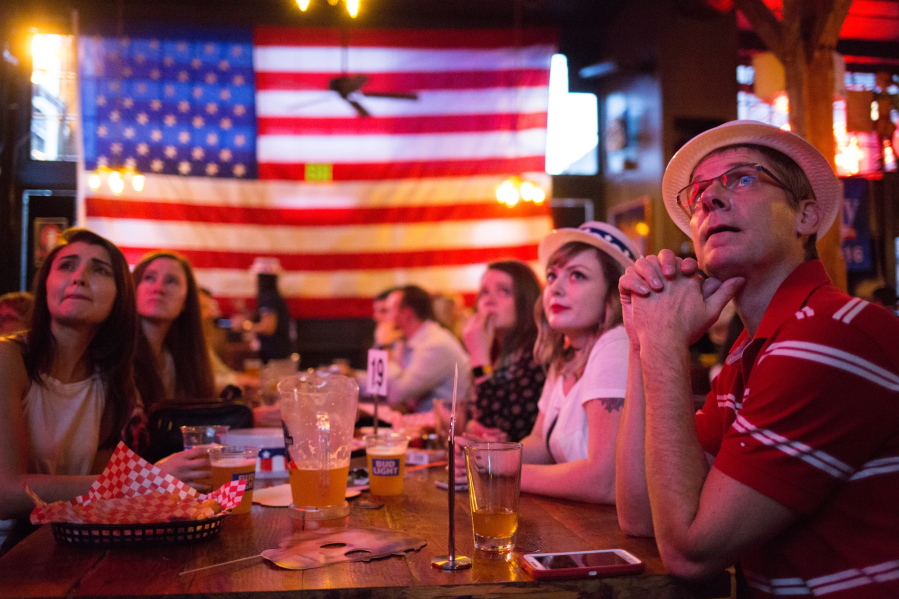SEATTLE — Washington voters decided the fate of several high-profile initiatives Tuesday, supporting a measure that would raise the statewide minimum wage, but defeating an initiative to impose the nation’s first direct carbon tax.
Initiative 1433 will raise the hourly wage by roughly $4 over three years, to $13.50. The measure also requires employers to provide paid sick leave — at least one hour for every 40 worked — that could be used to care for family members or as “safe leave” for those who miss work because of domestic violence.
The state’s current minimum wage is $9.47 an hour.
Supporters of I-1433 said giving low-wage workers hundreds in extra monthly pay will boost the state’s economy. Opponents of the measure argued that raising the wage by nearly half could cost jobs and force businesses to close.
Supporters said hundreds of thousands of Washington workers and families will get a raise, and more than 1 million workers will earn paid sick and safe leave.
“Initiative 1433 was based on a simple but radical notion — that the success of our economy is only as strong as the success of the hardworking men and women who drive it,” said Carlo Caldirola-Davis, campaign manager for Raise Up Washington and the Initiative 1433 campaign. “When voters filled in their ballots, they were clear — in Washington state, we want an economy that works for everyone, not just those at the top.”
But voters rejected Initiative 732, the carbon tax measure.
Sponsors of I-732 said residents have a moral responsibility to curb greenhouse gas emissions. The tax sought to encourage businesses to conserve or switch to clean energy by making fossil fuels more expensive, and make the tax system fairer by using the revenues to reduce other taxes.
Businesses say the tax will drive up fuel and energy costs and put Washington companies at a competitive disadvantage. The carbon tax would start at $15 a ton of carbon emissions in July, go up to $25 the next year and incrementally increase afterward.
Some major environmental and other groups — including those that backed Gov. Jay Inslee’s proposal last year to cap emissions and make carbon polluters pay — opposed the initiative. They said it took the wrong approach.
Supporters said that although the measure didn’t pass, I-732 serves as a model for states across the country.
“Carbon Washington will continue as an organization,” said Joe Ryan, co-chair of Carbon Washington. “Our grassroots base is our strength. We are energized to continue our work on carbon pricing in the state legislature, and to promote effective, equitable, economically sound and politically viable carbon pricing in other states and in Washington, D.C.”
Opponents said work still needs to be done.
“There is broad consensus that we need to do more to control carbon emissions, but there is a healthy debate about the right solution,” said Brandon Houskeeper of the Association of Washington Business. “Voters have rejected a flawed proposal to simply drive up energy prices on Washington families, workers and employers. Now it’s time to come back together to find solutions that reduce carbon emissions through collaboration, not higher energy bills.”
Voters approved a measure to reduce gun violence by taking firearms away from people who are found by a judge to be a danger to themselves or others.
Initiative 1491 will allow families of people in crisis to ask a judge to issue an extreme-risk protection orders that would temporarily prevent their loved ones from having access to firearms.
“This is really a victory for Washington families,” initiative campaign manager Stephanie Ervin said. “We’re celebrating for the lives this measure will save.”
Other initiatives on the ballot:
• Falling behind in early returns was Initiative 1464, which would make the most sweeping changes to the state’s campaign finance system in decades. Supporters said the ballot question — which also would create a publicly funded voucher system for political contributions — would make reforms in order to bring more accountability to the system.
Opponents said it will use tax dollars to benefit politicians while the state remains under a court order to put more money toward basic education. The measure’s voucher system would give voters three $50 “democracy credits” that they can use in state races every two years.
• Voters approved Initiative 1501, which would increase fines for fraud. The measure was a battle between a union and think tank over exempting home care workers’ information from public disclosure that is described as a consumer fraud measure.
The Freedom Foundation said it will immediately seek a restraining order to keep I-1501 from becoming law.
• Voters also approved Initiative 735, a proposal of a federal constitutional amendment that says free speech in the form of political contributions belongs to people, not corporations.



